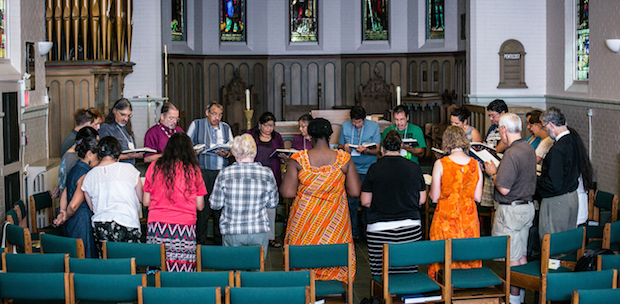Photo: Dhoui Chang/Wycliffe College
The Indigenous Leadership Development Program was launched at Wycliffe College, a graduate theological school within the University of Toronto, to give Indigenous leaders a space to learn, share, and develop within, as an alternative or complement to their traditional seminary education.
The program is a week-long experience which is being piloted for three years based off an initial donation. Thanks to the contributions of Mr. & Mrs. Jim and Edna Claydon, the $100,000 program was offered free-of-charge to the participants, including travel costs and accommodations. This year, the program saw a diverse assembly of 18 official students and 4 observers, and was focused on the theme of baptism.
From the Anglican Journal coverage by Tali Folkins:
The program attracted a diverse group of people, from the Arctic to Newfoundland to British Columbia: ordained deacons and priests, ordinands and lay people taking leadership roles in their congregations or preparing to do so, Golding Page says. It included both First Nations and Inuit people, young and old.
“We had one fellow who had just graduated from high school, and we had a few people who were grandmothers and great-grandmothers in their 70s,” she says. “The range of cultures that was represented was huge, and yet there was such a sense of unity in the group.”
One of the students, the Rev. Aigah Attagutsiak, an Inuit woman, was a deacon during the course but became an ordained priest shortly after, on Sept. 21. A highlight of the course, Attagutsiak says, was being able to speak her native language again. Originally from Arctic Bay, Nunavut, on the northern coast of Baffin Island, Attagutsiak has lived in Ottawa for the last 17 years.
“There were a few Inuit people there that I could talk to in my own language,” she says. “In the evening, we’d usually sit down and just talk about things at the end, which was really good.”
The program was discussed for years, as a way to give more to Indigenous leaders within the church, and recognize their roles and the importance of their ministry, dealing with a population that has suffered gross human rights violations and oppression. This summer, the Canadian government acknowledged, and formally apologized for, the wide-ranging human rights abuses perpetrated by members of both the Roman Catholic and Anglican churches of Canada through their Residential Schools administration.
If you attended this event, do you have any thoughts to share? Would the Episcopal Church and American seminaries be wise to offer a similar program?

